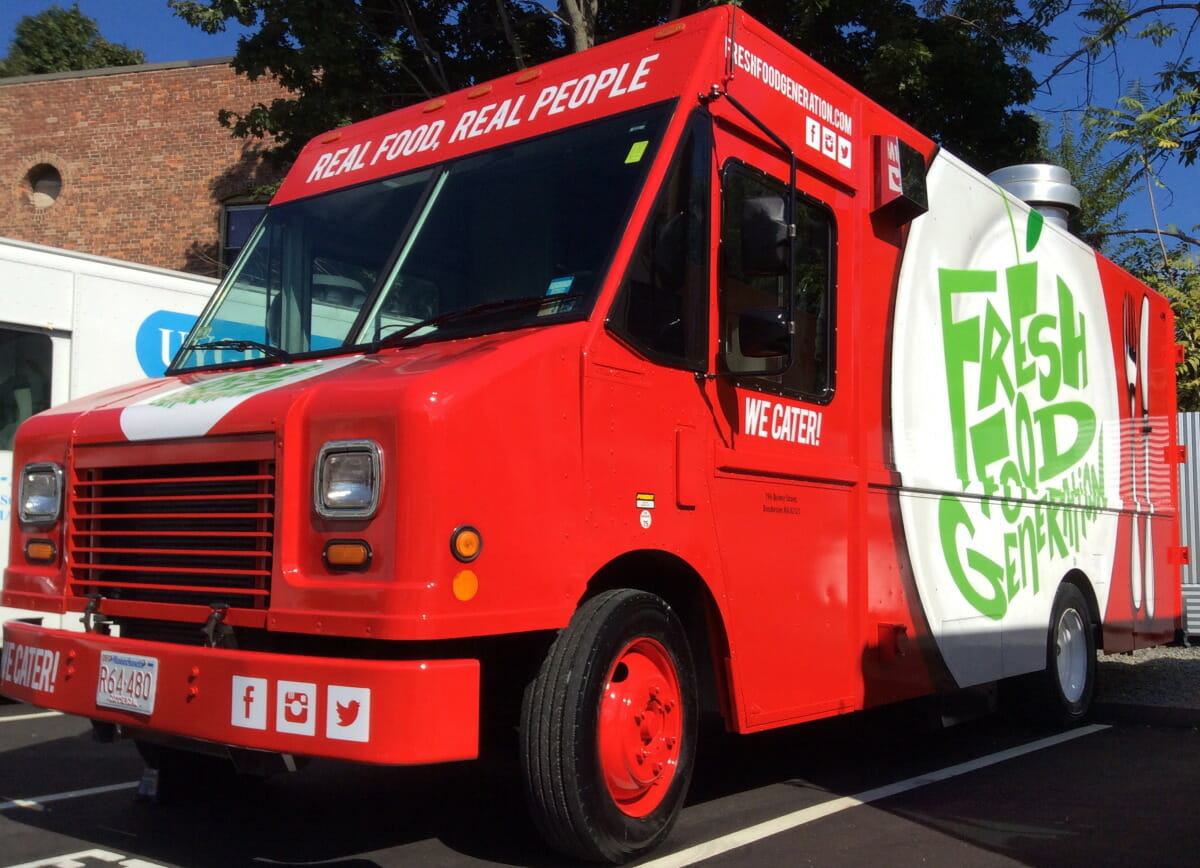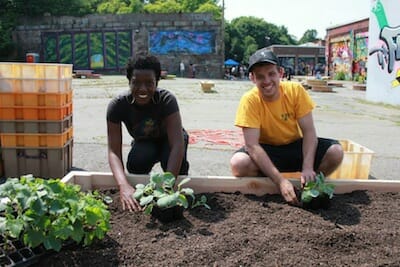They might deal in gourmet grilled cheeses, Korean-Mexican fusion and chocolate-covered bacon, but rare is the food truck that also traffics in food justice.

Luckily, Cassandria Campbell and Jackson Renshaw have added “activism” to the chalkboard menu. The founders of Boston-based Fresh Food Generation aim to bring culturally appropriate, sustainable meals to lower-income areas of the city that typically lack for healthy food options.
The partnership was written in the adolescent stars. The duo met as high schoolers at The Food Project, a local nonprofit that brings together teens from diverse backgrounds to assist in sustainable food production. For both, it was a life-altering experience.
The mission of Fresh Food Generation is to bring culturally appropriate, sustainable meals to lower-income areas of the city.
“Before The Food Project, I didn’t really know what I was passionate about or what I wanted to do,” says Renshaw. Campbell came in with more knowledge but still felt her eyes opened: “I knew that there were a lot of people who didn’t have a lot to eat, in this country, in other countries, in Boston, so I was really interested in food bank work. It had just never occurred to me that the food that they were eating was actually harmful.” (Areas like Dorchester, Mattapan and Roxbury, three of Boston’s biggest neighborhoods, suffer from higher rates of diabetes and obesity.)
Their subsequent accomplishments presaged future roles as food justice trailblazers. Campbell went on to Swarthmore, returned to The Food Project as a development coordinator, then earned her master’s in city planning from MIT. Renshaw, meantime, studied ecological agriculture at the University of Vermont.
So what brought them back together? Campbell’s commuting stroke of genius. “I was working downtown, and the food truck scene was really popular,” she recalls. But living in Roxbury, a less solvent part of the city, “I realized that my food options were very limited and that I was traveling to other neighborhoods to get good food.” Creative eating options, mobile kitchens … the Fresh Food Generation seed was planted. Campbell then approached old friend Renshaw with the idea, he readily acquiesced, and the rolling revolution began.
But here’s the thing: neither Campbell nor Renshaw was a cook. By any stretch. As Campbell puts it, they had vision but “had never stood on their feet for hours chopping carrots.
“Jackson had a background in agriculture, I had a background in economic and urban planning, but neither one of us had a background in the culin
Did doubt creep in at any point in the process? “I think there were a few months where we had to convince ourselves that the idea was legit,” Campbell says with a laugh.
Outside supporters, however, were across-the-board enthusiastic. First, the pair won a pitch contest through Future Boston Accelerator Program, which supports local creative entrepreneurs (“We were the only food business in the group,” says Campbell). They then raised more than $50,000 via a Kickstarter campaign that concluded at the end of last year. They also built up strong word of mouth through catered events and public fundraising events.
“The idea is that the farm-to-plate movement is for everyone. It’s not just this thing that people with money can afford to do.”
As for the truck itself, Campbell and Renshaw acquired that sucker in Connecticut this spring and finally unveiled it earlier this month. “We have been really committed to making sure that people can relate to this farm-to-plate movement, so we’ve partnered with artists that in a lot of ways are much cooler than Cassandria and I,” Renshaw says, only half-jokingly. Local muralist Cedric Douglas designed the logo, and graffiti artist DEME5 painted the truck itself, including the back picture of a young boy, above which reads “Real Food, Real People.”
Their catering efforts formally launch in November; while the truck’s schedule is being finalized, the hope is to debut at the local winter farmer’s market that starts up in January. Meantime the duo will continue to prove that “sustainable” and “accessible” are not mutually exclusive food terms.
“The idea is that the farm-to-plate movement is for everyone,” Campbell says. “It’s not just this thing that people with money can afford to do.”